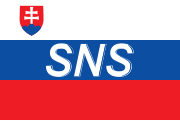Slovakiska nationalistpartiet – Wikipedia
| Slovakiska nationalistpartiet | |
 | |
| Partiordförande | Andrej Danko |
|---|---|
| Grundat | december 1989 |
| Politisk ideologi | Ultranationalism Högerpopulism Euroskepticism |
| Politisk position | Extrem höger Tredje position |
| Internationellt samarbetsorgan | Ingen |
| Europeiskt samarbetsorgan | Rörelsen för frihetens och demokratins Europa (2011- ) |
| Politisk grupp i Europaparlamentet | Gruppen EFD (2009-2014) |
| Slovakiens nationalråd | |
| Röstandel | 8,60 procent |
| Mandat | 15 / 150 |
| Webbplats | |
| http://www.sns.sk | |
Slovakiska nationalistpartiet (slovakiska: Slovenská národná strana, SNS) är ett ultranationalistiskt[1][2][3][4][5][6] och högerpopulistiskt[7] politiskt parti i Slovakien, som sedan mars 2016 är ett av landets regeringspartier.
SNS grundades i december 1989 och ser sig som arvingen till det historiska parti med samma namn som existerade mellan 1871 och 1938. Partiet säger sig vila på tre pelare: kristendomen, nationalism och socialism. Partiet kallar sig självt för ett högerparti men beskrivs i massmedia som ett ultra-nationalistiskt[1][8], högerextremt[9][10][1][11] och nyfascistiskt[12] parti på grund av partiets offensiva och ofta rasistiska retorik[13][14][15][16] vid uttalanden om ungrare, romer, judar och homosexuella. Det bildade 2006-2010 regering i koalition med det socialdemokratiska Riktning – socialdemokrati.
I valet 2012 förlorade SNS sina platser i parlamentet, men i valet 2016 kom partiet återigen in med nio procent av rösterna. I samma val fick partiet parlamentariskt sällskap av det än mer nationalistiska Folkpartiet - Vårt Slovakien. I mars 2016 bildade SNS regering tillsammans med Riktning – socialdemokrati, Most–Híd och Sieť.
Källor
[redigera | redigera wikitext]- ^ [a b c] New Slovak Government Embraces Ultra-Nationalists, Excludes Hungarian Coalition Party Arkiverad 5 januari 2011 hämtat från the Wayback Machine. HRF Alert: "Hungarians are the cancer of the Slovak nation, without delay we need to remove them from the body of the nation." (Új Szó, April 15, 2005)
- ^ Auer, Stefan (2004). Liberal nationalism in Central Europe. Contemporary Russia and Eastern Europe. "1.". Routledge. sid. 44. ISBN 0-415-31479-8. ”Miroslav Sladek in the Czech Republic and Jan Slota in Slovakia stand out as two leaders of extreme nationalist parties who...”
- ^ Jeffries, Ian (2002). Eastern Europe at the turn of the twenty-first century. Routledge. sid. 352. ISBN 0-415-23671-1. ”Slovak National Party: led by Jan Slota. Extreme nationalist”
- ^ P. Ramet, Sabrina (1997). Whose democracy?: nationalism, religion, and the doctrine of collective rights in post-1989 Eastern Europe. Rowman & Littlefield. sid. 128. ISBN 0-8476-8324-9. ”...Meciar established his 1994 coalition government with the extreme-nacionalist Slovak National Party (SNS, led by Ján Slota, mayor of Zilina...”
- ^ ”International Herald Tribune's article about Hungarian-Slovak relations”. International Herald Tribune. 29 mars 2009. Arkiverad från originalet den 14 mars 2007. https://web.archive.org/web/20070314014708/http://www.iht.com/articles/ap/2006/09/07/europe/EU_GEN_EU_Slovakia.php. Läst 10 januari 2011.
- ^ ”Official Results: Slovak Ultra-Nationalists Grab Seat In EU Vote”. Nasdaq.com. http://www.nasdaq.com/aspx/stock-market-news-story.aspx?storyid=200906072106dowjonesdjonline000468&title=official-resultsslovak-ultra-nationalists-grab-seat-in-eu-vote. Läst 10 januari 2011.
- ^ Wolfram Nordsieck. ”http://www.parties-and-elections.de/slovakia.html”. Parties-and-elections.de. http://www.parties-and-elections.de/slovakia.html. Läst 10 januari 2011.
- ^ ”New Slovak PM promises to punish extremism, pledges to soften economic reform by previous government”. International Herald Tribune. 14 mars 2007. Arkiverad från originalet den 14 mars 2007. https://web.archive.org/web/20070314014708/http://www.iht.com/articles/ap/2006/09/07/europe/EU_GEN_EU_Slovakia.php.
- ^ Cas Mudde (2005). Racist extremism in Central and Eastern Europe. Routledge. sid. xvi, 314. ISBN 0415355931. http://books.google.hu/books?id=YB-ZwiBf5HgC&pg=PA245&lpg=PA245&dq=sns+extremist+party&source=bl&ots=wnfyjLqnlx&sig=wfuD5NmoLykU_WXCRze7vqs4Z8c&hl=hu&ei=yYQWSsizFcKQ_Qa99eCDDQ&sa=X&oi=book_result&ct=result&resnum=5#PPR13,M1. Läst 22 maj 2009
- ^ Zoltan D. Barany (2002). The East European gypsies: regime change, marginality, and ethnopolitics. Cambridge University Press. sid. 313, 408. ISBN 0521009103. http://books.google.hu/books?id=yTylND961ZMC&pg=PA313&lpg=PA313&dq=sns+extremist+party&source=bl&ots=_VxIIE_hea&sig=pRZHwg9hNk68Z-_CHIpbibMOKJc&hl=hu&ei=9ocWSp23NMOPsAbGhtGRAg&sa=X&oi=book_result&ct=result&resnum=9#PPA313,M1. Läst 22 maj 2009
- ^ The Steven Roth Institute: Country reports. Antisemitism and racism in Slovakia Arkiverad 31 maj 2013 hämtat från the Wayback Machine.
- ^ Democratic Dilemma - OhmyNews International Arkiverad 26 april 2009 hämtat från the Wayback Machine.
- ^ ”New Slovak Government Includes Extreme Right Party”. European Roma Rights Centre. http://www.errc.org/cikk.php?cikk=2610.
- ^ ”Europe diary: Franco and Finland”. 6 juli 2006. http://news.bbc.co.uk/2/hi/europe/5151504.stm.
- ^ Slovakia's new rulers, strange bedfellows Arkiverad 5 februari 2008 hämtat från the Wayback Machine.
- ^ Kristina Mikulova's (Financial Times) article on the pages of CEPA Arkiverad 20 februari 2007 hämtat från the Wayback Machine.


 French
French Deutsch
Deutsch